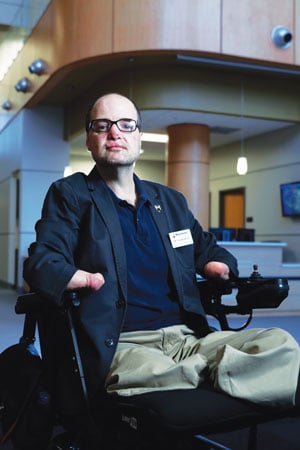Pharmacist credits amputations with leading him to a career in emerging field of health law

Photograph by Wayne Slezak
The next day Smith, then 30, was quarantined at a hospital and put into a medically induced coma. He would endure four amputations on different limbs over several weeks: just above the right knee; below the left one; left arm at the wrist; and right arm a bit higher than that.
He had meningococcal meningitis, the deadly bacterial form of the disease often associated with college students. Sepsis set in and he had a 4 percent chance of surviving.
All of this changed Tommy Smith’s life for the better, hard as that is to believe. He swears by it, and the appreciation for living he gained. “And going to law school restored me,” he says.
Smith is now among a rare breed of pharmacy school professors with law degrees who specialize in legal issues pertinent to pharmacists. Along with his JD from the St. Louis University School of Law in 2005, Smith received a certificate from the school’s Center for Health Law Studies. (He got his pharmacy degree at the university in 1994.)
He has become such a hot commodity that he was hired last year as assistant dean for assessment and accreditation at Manchester University’s College of Pharmacy in Fort Wayne, Indiana. He is leading efforts in its bid for accreditation. In 2014, Smith completed the Academic Leadership Fellows Program of the American Association of Colleges of Pharmacy while he directed the online master’s degree program in pharmaceutical outcomes and policy at the University of Florida’s College of Pharmacy.
TOUGH SUBJECTS
Smith developed a specialty in assessing and evaluating pharmacy education—figuring out what should be taught and whether it’s working. And he has continued teaching pharmacy law, including accessibility for customers with disabilities, the ins and outs of monitoring scheduled drugs, and increased concerns about malpractice as pharmacists assume greater roles in patient care, such as joining integrated health teams making rounds in hospitals or administering vaccinations in retail pharmacies.
As a newly minted lawyer in 2005, Smith joined the ABA and its Health Law Section to keep up with changes in the law and to network. He has gone far beyond that, however, sitting on its leadership council and co-chairing its annual program on emerging issues.
The former dean at Smith’s pharmacy alma mater reached out to see whether he’d like to teach there. “I thought I’d have to pay more dues before that opportunity,” says Smith, who found himself teaching the introductory course with a law and ethics component, along with other courses at the St. Louis College of Pharmacy.
Smith moves about in an electric wheelchair, which appears to have a big human smile as its front bumper. But that’s just the effect of Smith’s typical visage. With stellar career accomplishments against what for most would be unbeatable odds and unbearable consequences, Smith is most remarkable for being so upbeat and positive that—to fall back on a word that almost seems unsuitable—it is infectious.
“With a lot of different personalities and a lot of lawyers with strong personalities, he comes to the table very inspirational, understanding and compassionate,” says Adrienne Dresevic, who is on the ABA Health Law Section council with Smith and has worked with him on other bar efforts. A founder of the Health Law Partners firm in Southfield, Michigan, Dresevic says Smith “has used the struggles in his life in positive ways, and he’s just a great mentor for everyone.”
REHAB BATTLE
During a year and a half of intense physical and occupational therapy, Smith saw the bad side of insurance coverage as he watched others reach benefit limits too soon. And he felt the pinch himself when an administrator said he didn’t require so much rehabilitation for the meningitis.
“But I was rehabbing the amputation of four separate limbs, four times the amount of treatment she was arguing I was eligible for,” Smith says. “From my pharmacy background I knew a little bit about claims, codes and billing, and I knew she was trying to pull the wool over my eyes.” His physical therapist pushed back, too, and the decision was reversed. During rehab, Smith worked part time at his old job, where he had developed and was director of a pharmacy for residents in a group of nursing homes in St. Louis. It didn’t go well. He was stymied by even simple things, such as navigating aisles and negotiating shelves. “I was feeling a bit less than what I’d been because of my physical limitations, and thought there’s something more I ought to be doing with my life,” he says. “Disability issues really got me interested in the law, and my interest in health law generally evolved from that.”
While Smith’s approach to life and work became much more philosophical after his illness, he brings with it a better understanding of the practical and granular.
Smith was one of the first external hires for Raylene Rospond, who came in as pharmacy school dean at Manchester University in 2014.
“His mix of skills and baseline knowledge in pharmacy, mixed with his legal training and then his personality is just a very good combination for this position,” Rospond says. “He’s just an incredible addition to our organization.”
And to several others.
This article originally appeared in the May 2016 issue of the ABA Journal with this headline: “No Quitter: For Tommy Smith, amputations added to his life: a love of law.”



